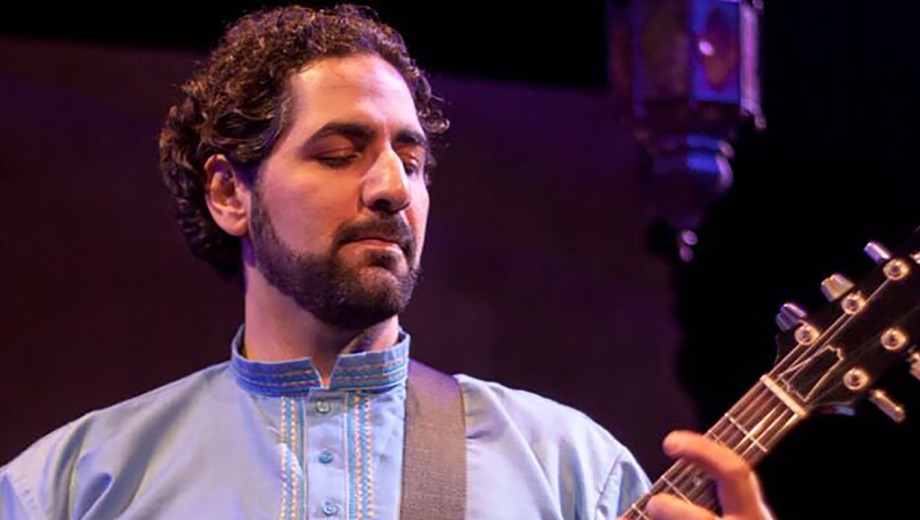Scholars of migration note that borderlands become unique cultures in their own right—new territories forged by the meeting of distinctive cultures. For Palestinian American performing artist and ethnomusicologist Ronnie Malley, AM’23, this was a meaningful idea that came alive for him in an unexpected way as he presented his creative work for audiences after the events of October 7, 2023.
Malley recounts that he didn’t feel much like playing music at the time, and certainly not in public performance. But he had shows lined up, and so at Benaroya Hall in Seattle later that month, he decided to restage his one-person play Ziryab: The Songbird of Andalusia, which he had originally performed in 2016.
Ziryab is a music-filled tale that follows the historical figure Ziryab from Baghdad to Cordoba, Spain, where he introduced the oud to western Europe in the ninth century. A plucked string instrument, the oud became the forerunner to the lute and guitar while also symbolizing the wider musical merging of Arabic song forms into the music of the Iberian Peninsula during the medieval era. An oud and guitar player himself, Malley punctuates the play’s monologues with performance on both instruments as he paints a picture of Ziryab’s Cordoba—a “very cosmopolitan society” that reminds him of the cultural diversity of contemporary nations like the US today.
That level of diversity appeared in the Seattle audience for Ziryab. After the show, its promoter reported that he had seen “such a mix of people,” and Malley himself recollects that he saw “Jewish friends, Muslim friends, Iraqi friends, and Palestinians.” He sensed that people of all kinds were hungry for the opportunity to make sense of the war, then in its earliest days, describing the performance space as “itself a borderland.”
Leaning into that metaphor, he began to imagine the audiences for his future performances as a “third space,” where cultural mingling would allow people to learn and reflect at a time of crisis. “We created a space for people to come for decompression, for healing. A space for people to come and breathe, to come up for air,” he says. “I saw that as almost like a cue for me to create this process and start writing about it. And so at all my performances thereafter, and at other friends’ performances, I would ask—particularly of one friend of mine, she’s Israeli American—‘How have your performances been?’” To better gather feedback, Malley also began to use “talk backs” at shows to hear from audience members directly. Malley shared their commentary as part of his presentation at the “Borderlands of Sonic Encounters” symposium held on campus in February of 2024.
Malley was prompted by reactions to Ziryab to develop a new performance piece that he’s now performed for a handful of institutions, including the Chicago Humanities Festival. Called On This Earth, it takes inspiration from a poem by the Palestinian poet Mahmoud Darwish as well as from Pale Blue Dot: A Vision of the Human Future in Space (Random House, 1994) by Carl Sagan, AB’54, SB’55, SM’56, PhD’60. “I’m paraphrasing,” he says, “but Sagan said, ‘Everyone you’ve ever known, everything that you’ve ever heard, all of these things occurred on this little blue dot, this little pale blue dot” in the cosmos—a perspective that shifts the view of Earth as a place of borders and nations to a more expansive, planetary view. Malley adds, “Let’s change the story.”

